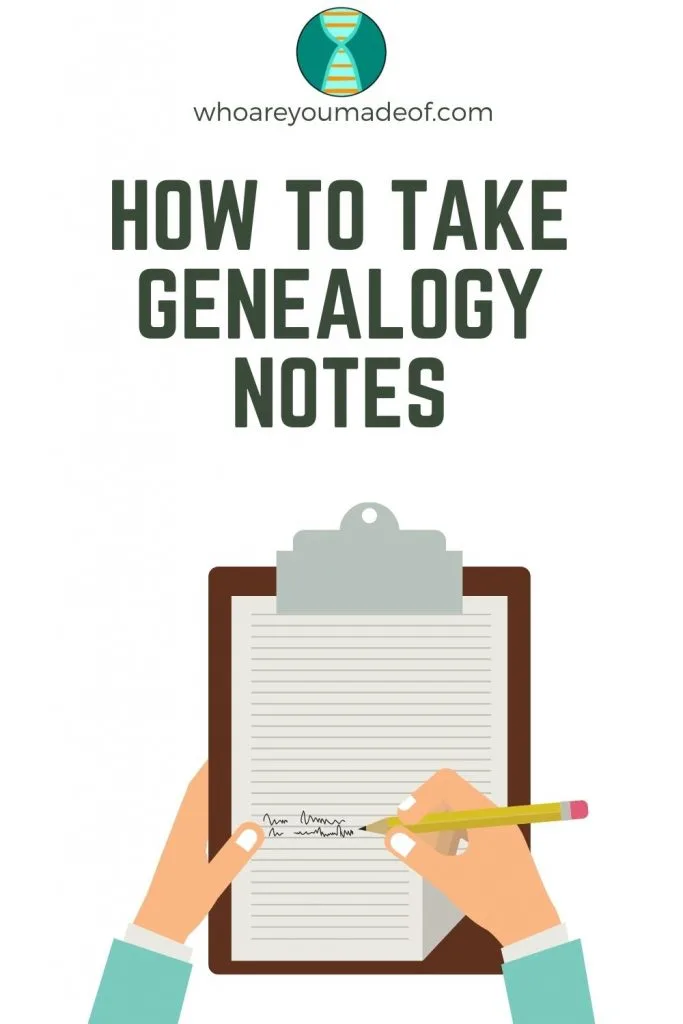Do you want to know how to take genealogy notes? Taking good notes can save you time in the future and help keep your research focused.
In this post, you'll learn the best way to take genealogy notes. Plus, I'll explain why it's important to take notes of your daily research even if you don't find what you are looking for that day.

Why take genealogy notes?
My great-great grandmother and her daughter-in-law, my great-grandmother, were huge fans of genealogy. They spent lots of time studying, reading and researching our family lines.
Today, I have beautiful pedigrees and some nice family stories written based on their research. What I don't have are their notes.
I found myself wishing that I could read back through their old notes and find out how they came to certain conclusions. Additionally, it would be amazing to know exactly where they did and didn't look for records.
Since I don't have their notes, I'm sure that I have spent a lot of time duplicating their work. While it's good to double-check the research of other genealogists, it would still save me time to know more about the research I am double-checking.
After coming to the conclusion of how important notes are, I realized that I could improve the way I was taking notes and practice better organization. If I'm honest, I know that I've spent time looking for a particular record multiple times in the same repository because I forgot that I had already checked there and it wasn't there.
To summarize, taking (good) genealogy notes can help you:
- Avoid forgetting important details
- Save time in the future by not having to repeat things you have already done
- Help you focus your future research by keeping track of thoughts and ideas about what to do next
Plus, wouldn't it be cool if your great-great grandchild could read through your genealogy notes someday and pick up where you left off? A girl can dream, right?
Where to take genealogy notes?
Family tree researchers have lots of options when it comes to taking notes about their research. Some people love using technology and others prefer handwritten notes.
For those who love technology, a simple Microsoft Word or Google Docs file is sufficient.
Personally, I love journals and notebooks. Nothing compares to the feeling of an actual book of notes.
I put my method of keeping genealogy notes into journal format, which can be ordered on Amazon using the link below. There are more than two hundred pages in the journal - space for lots of daily research entries.
How to take good genealogy notes
The notes of every great genealogist will vary, but there are some best practices that we can all implement in order to make sure we keep our research organized.
Write neatly
This should go without saying, of course, but it's necessary to mention. Your writing should be as legible as possible.
Remember, you don't know how long from now you might need to refer to these notes and you might not remember what you were thinking at the time.
By writing neatly, you will save yourself (and maybe others in the future) time and frustration.
Include full name and full date of person (or people) who record is about
Even though it might seem boring to write out a full name or date related to a record that you have found, you should always do it. Avoid using initials or just the last two years of a date.
When researching ancestors from a long time ago, the year becomes especially important. For example, if you say that someone was born in '36, most people will think 1936.
In reality, it could be 1836, 1736 or even 1636. So, use the full year. I promise you will thank yourself.
Don't use unique abbreviations
When I was in college, I worked as a server in a restaurant. The restaurant had very specific abbreviations that we had to use when we wrote down a customer's orders.
We were trained thoroughly in using these abbreviations so that way anyone else in the entire restaurant could easily read what we wrote and avoid mistakes.
We are lucky that the English language (or whichever language that you speak) has already been designed for us and we don't need to use creative abbreviations, expressions, etc in order to communicate with each other.
When we take genealogy notes, we should not get creative and come up with shorthand words to save time or space. Remember, we want other people (including ourselves) to be able to read what we wrote at any time in the future.
Don't change spelling or information from original record
Have you ever found a record that *almost* matches your ancestor? If you think that the record really is connected with your ancestor, but the spelling or date is just not quite right, it's okay to allow it into your notes.
However, it is important to retain the original information from the record. This means that you should not change the spelling, dates, locations from the record in order to make it better match what you already know about your target ancestor.
For example, let's say we are researching Johnathon Swift, born June 11, 1810 in Winchester, Massachusetts.
If we find a record for a Johnathon Swift, born February 11, 1810 in Winchester, Massachusetts, it actually could pertain to our ancestor. Maybe the June date is wrong and was mistakenly copied onto a document somewhere.
Alternatively, maybe the February date was entered incorrectly when the index for the documents was created.
Either way, when we take notes about this record, we should document the date discrepancy. We might not really know which date Johnathon was born, and there could have been two people named Johnathon born months apart in the same town.
Think: cousins.
The same is true for spellings that are different, or birth records that list different parents, or different birth locations. Even if we think we know the correct information, we should always document the actual details included in the source we are recording in our notes.
Record all details about source
Make sure that you include as many details from the original document as possible. As you already know, even the most seemingly insignificant detail can help you crack family tree mysteries.
By including every detail from the source you have discovered, you will get more ideas and do better future research.
Include theories, ideas and conclusions
It's a good idea to include ideas or theories that you have in your genealogy notes, but make sure that they are identified as such. Sometimes, we can make educated "guesses" in genealogy and be correct, and so it is good to write down what those guesses are.
I like to include a section in my notes for this type of information because I often get ideas about an ancestor when I am in the midst of researching them. If I write them down, I can come back to them later and see if my idea pans out.
Sometimes they do and sometimes they don't, but if you write them down, you will always have a record of the things that you have already tried.
To keep focused, include "next steps"
Much of the time, I find myself running out of time to keep researching. There is always "one more place to search" in genealogy, and I like to write this down before I conclude my research for the day.
Life happens, even to us genealogists!
I write down the next steps so the next time I am researching that ancestor, I can pick up right where I left off and search that next index, website, repository, or whatever it might be.

Conclusion
I hope that this post has helped you understand more about how and why to take good genealogy notes. If you have any questions, or if you would like to include your own ideas about note-taking, I would love to hear from you in the discussion below.
Thanks for stopping by today!

Lori
Wednesday 26th of May 2021
I found this article through the Cluster Research email you sent recently. And I can’t tell you how thrilled I am that I actually remember how I got here! Rabbit trails, sweet rabbit trails... At any rate, I’m wondering if the link to the Genealogy Journal is working. It took me to a site that seems more directed to website owners. Thanks for checking that for me! Warmest regards from Washington State Lori